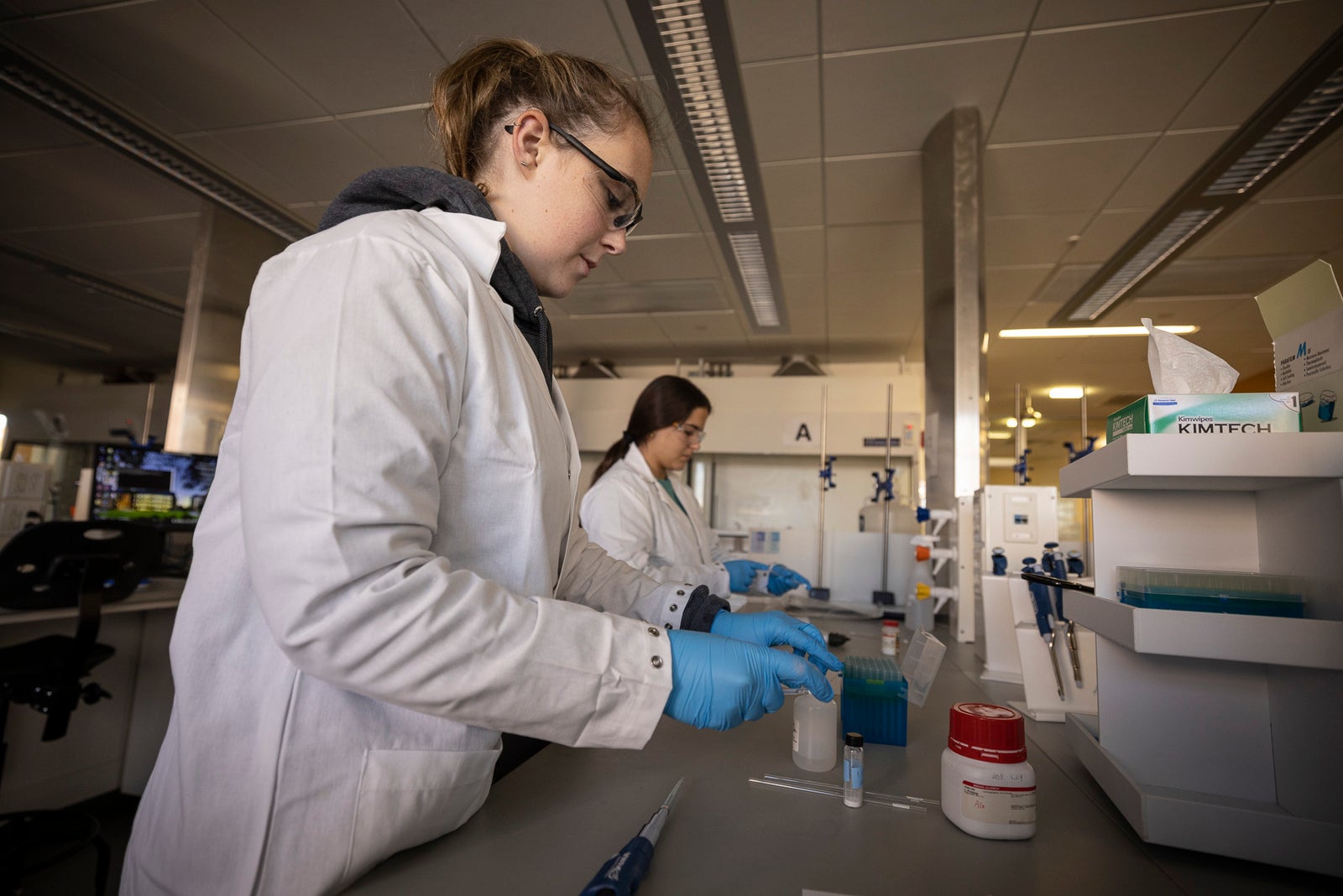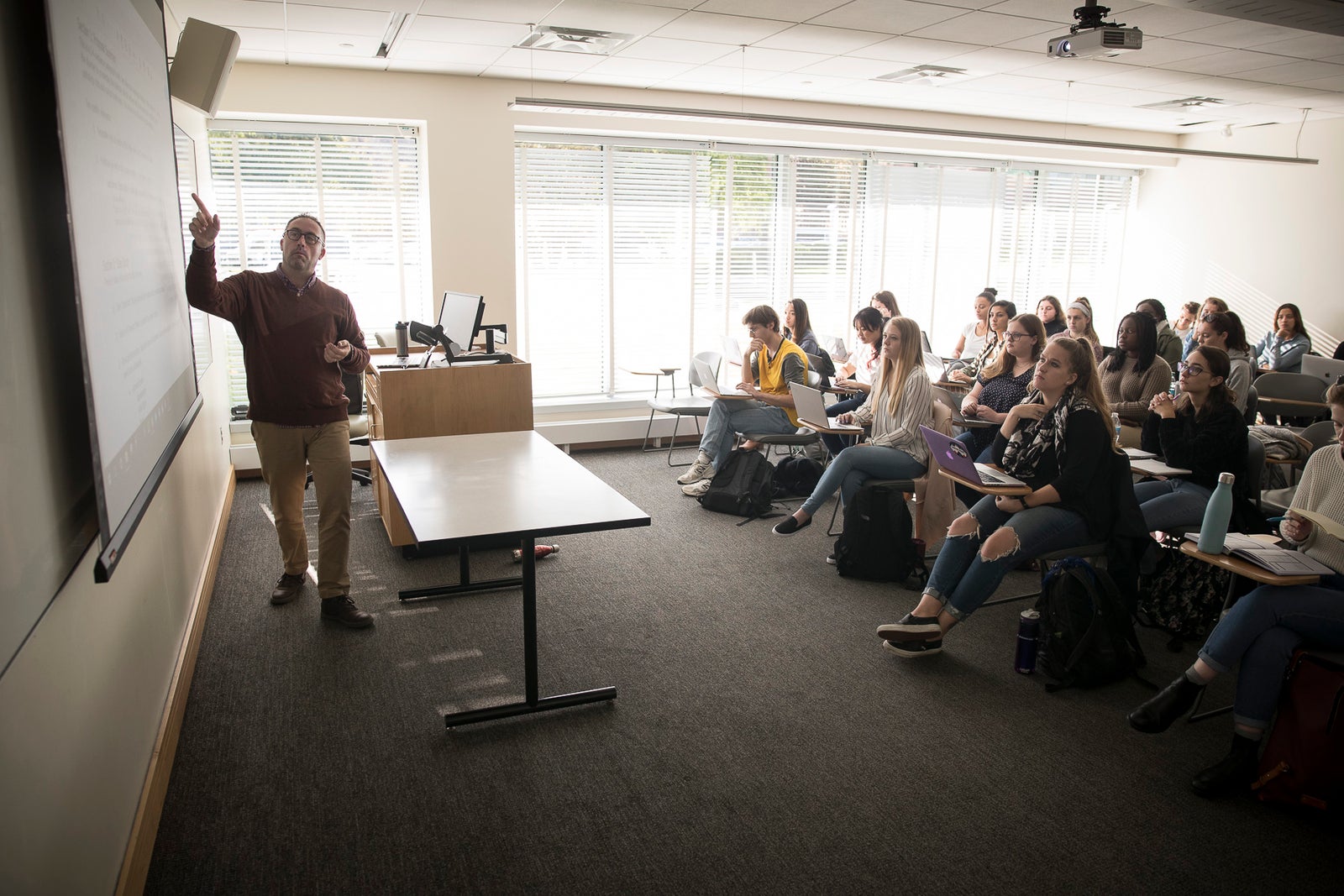Combine Science, Innovation, and Business for Careers in Biotech, Biomedicine, and Public Health
The biotechnology major at Emmanuel prepares you to turn scientific discovery into real-world solutions. Through courses in molecular biology, genetics, biochemistry, and lab-based research, you’ll gain the technical skills to contribute to breakthroughs in medicine, sustainability, and global health, from developing diagnostics and treatments to advancing vaccine technologies.
What sets Emmanuel’s program apart is its interdisciplinary approach. With integrated coursework from the School of Business & Management, you’ll build strengths in leadership, strategy, and communication—skills biotech employers look for alongside scientific expertise.
Situated in the heart of Boston’s biotech corridor, Emmanuel connects students to internships, research partnerships, and career opportunities with top labs, startups, and global pharmaceutical companies. Graduates are ready to lead in biomedical science, pharmaceuticals, public health and more.
A Best-in-Class Experience
Get to know the people and programs that will define your academic journey.

Becca Markie ’25 Advances ALS Research at Harvard
Supported by the Merck Scholarship, the biotechnology major is interning in Harvard Med's neuroimmunology lab, contributing to promising treatment research for ALS and frontotemporal dementia and shaping her path toward a PhD.

Meet the Faculty
Our distinguished faculty publish, exhibit and research. Present, compose and chair. Inspire and collaborate.
The Curriculum
View the 2024-2025 Academic Catalog to find course titles, numbers and descriptions.
Requirements for B.S. in Biotechnology
- BIOL1105 Introduction to Cellular and Molecular Biology (SI-L) (NSL)
- BIOL1106 Introduction to Organismic and Evolutionary Biology (SI-L) (NSL)
- BIOL2123 Genetics
BIOL2131 Biochemistry - BIOL2301 Experimental Biology
- BIOL4160 Seminar
- BIOL4194/4195 Research Internship in Biotechnology OR INT3211 Experiential Internship in Biotechnology
- CHEM1101 Principles of Chemistry I AND CHEM1102 Principles of Chemistry II
- CHEM2101 Organic Chemistry I
Electives:
In addition to the core Biology courses, students must take the following biotechnology–relevant classes:
- BIOL2303 Biotechnology Applications
- BIOL3103 Cell Biology with Lab
- BIOL3127 Microbiology with Lab (Prerequisite; BIOL2301, or permission of the instructor)
- MGMT1101 Introduction to Business
- MGMT2301 Legal Environment of Business
- MGMT2307 Organizational Behavior (SA) (SS) (DM) (WI)
Upon completion of the Biotechnology program:
- Students will be well trained in the laboratory applications and methods required to carry out biotechnology research. They should be able to assess the relevant scientific literature and apply their assessment to research that has the potential to be commercialized.
- Students will additionally understand basic principles of organizational behavior and management. They should understand the legal basics of management, and possess a basic knowledge of the fundamentals of business strategy. They should be able to develop plans and approaches to commercialize the outcomes of scientific research.
- Finally, Emmanuel College graduates are expected to approach their profession ethically and with a consideration of how their activities can contribute to equity and social justice.
What can I do with a degree in biotechnology?
A degree in biotechnology can prepare you for a variety of careers in the biotech industry, including research and development, quality control and assurance, production and manufacturing, regulatory affairs, technical support, and sales and marketing. You may also work in academic research, government agencies, or non-profit organizations. Some specific career paths you can pursue with a degree in biotechnology include:
- Biotech Research Scientist: Conduct research to develop new products or improve existing ones using biotechnology techniques and methods.
- Quality Control and Assurance Specialist: Ensure that products meet quality and safety standards by testing and analyzing samples using various methods and equipment.
- Biotech Manufacturing Engineer: Develop and improve manufacturing processes to produce biotech products more efficiently and cost-effectively.
- Regulatory Affairs Specialist: Ensure compliance with government regulations and policies related to the development, production, and sale of biotech products.
- Biotech Sales and Marketing Specialist: Promote and sell biotech products to potential customers, such as research labs, pharmaceutical companies, or biotech startups.
- Technical Support Specialist: Provide technical assistance and troubleshooting to customers who use biotech products and services.
- Biotech Project Manager: Plan and oversee the development, testing, and production of biotech products, ensuring that timelines and budgets are met.
Overall, a degree in biotechnology can provide you with the knowledge and skills to work in a rapidly growing and dynamic field that has the potential to make a significant impact on human health and the environment.
Biotechnology graduates are equipped with a unique blend of skills that are highly sought after in various sectors, including healthcare, pharmaceuticals, agriculture, environmental science, and industrial biotechnology. Here are some of the most in-demand skills for biotechnology graduates:
- Laboratory Skills: Proficiency in laboratory techniques such as PCR (polymerase chain reaction), gel electrophoresis, DNA/RNA extraction, cell culture, and chromatography.
- Molecular Biology: In-depth knowledge of molecular biology principles, including gene cloning, sequencing, and genetic manipulation.
- Bioinformatics: Ability to use computational tools and software for analyzing biological data, including proficiency with databases, sequence alignment tools, and bioinformatics software (e.g., BLAST, GenBank, and various genomic tools).
- Data Analysis: Strong skills in statistical analysis and data interpretation, often using software such as R, SAS, SPSS, or Python for analyzing experimental data.
- Cell Biology: Understanding of cell structure, function, and processes, including cell signaling, apoptosis, and cellular metabolism.
- Genetics and Genomics: Expertise in genetic principles and techniques, including knowledge of CRISPR and other genome editing technologies.
- Bioprocessing and Biomanufacturing: Knowledge of scaling up laboratory processes for industrial production, including fermentation, downstream processing, and quality control.
- Analytical Techniques: Proficiency in using analytical instruments such as mass spectrometry, HPLC (high-performance liquid chromatography), and spectrophotometry.
- Regulatory Compliance: Understanding of regulatory requirements and standards in biotechnology and pharmaceuticals, such as GMP (Good Manufacturing Practices), GLP (Good Laboratory Practices), and FDA regulations.
- Project Management: Skills in planning, executing, and managing research projects, including budgeting, scheduling, and resource allocation.
- Communication Skills: Ability to clearly communicate complex scientific concepts and findings to diverse audiences, both in writing and verbally.
- Problem-Solving: Strong analytical and critical thinking skills to troubleshoot experiments, optimize processes, and develop innovative solutions.
- Teamwork and Collaboration: Ability to work effectively in interdisciplinary teams, collaborating with scientists, engineers, and business professionals.
- Technical Writing: Proficiency in writing scientific reports, research papers, and grant proposals.
- Ethical Awareness: Understanding the ethical implications of biotechnology research and applications, including bioethics and responsible conduct of research.
- Innovation and Creativity: Ability to develop new ideas and approaches to solve scientific problems and create novel biotechnological applications.
- Adaptability: Flexibility to adapt to new technologies, methodologies, and industry trends in a rapidly evolving field.
- Business Acumen: Understanding of the commercial aspects of biotechnology, including market analysis, intellectual property, and business development.
- Environmental and Sustainability Knowledge: Awareness of how biotechnology can be applied to address environmental challenges and promote sustainability.
- Clinical and Translational Research: Knowledge of the process of translating laboratory research into clinical applications, including understanding of clinical trials and regulatory pathways.
These skills enable biotechnology graduates to pursue diverse and rewarding careers in research and development, clinical and regulatory affairs, quality control, production, and many other areas within the biotechnology industry.
Where Essential Values and Skills Meet the Real World
Along with areas of knowledge and major requirements, you will cultivate essential values in the classroom and complete two courses in each area:
- Social Justice (SJ): Develop knowledge, skills, values and motivation to participate beneficially in activities of personal and public concern.
- Diversity & Multiculturalism (DM): Understand the complexity of identity the historical truths of different cultural perspectives to address bias and examine contemporary social issues.

One hundred percent of Emmanuel students complete an internship as part of the core curriculum. In a city as dynamic as Boston, your options are bound only by the limits of your curiosity.
Students in the Biology department complete a range of research- and lab-based internships at area institutions such as Boston Children's Hospital, Dana-Farber Cancer Institute and Harvard Medical School, at Boston-based biotechnology companies such as Matrivax and Biogen, or alongside faculty on Emmanuel's campus.

In all majors, the Capstone Experience involves completing a significant piece of work that requires the integration and application of learning from multiple courses.
As a biology student, you will discuss research on an advanced topic that integrates learning from previous courses (recent topics include the human microbiome, CRISPR and gene editing, macromolecular machines and the healthy brain). Aided with faculty and peer feedback, you will perform a literature review related to the focus of the class, formulate a hypothesis, and then craft, assemble and present an NSF-style grant.

Science & Health Spotlight
See more news and stories related to the School of Science & Health


